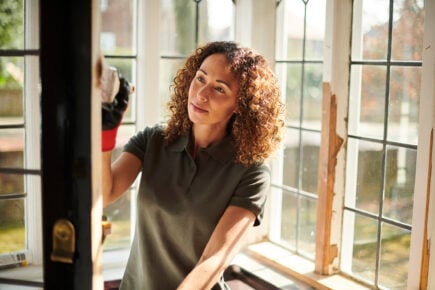It’s not an action film, but settlement day should be every bit as exciting for a new homeowner. It’s usually the culmination of years of planning to buy a house — and it all ends today with your first property acquisition. This means you finally get the keys to your own pad while the seller can get their hands on what is likely a substantial sum of money.
There are, however, a few final hurdles you’ll need to get over. So, understanding how the day works and what to expect should help ensure that it runs as painlessly as possible for the buyer and seller.
What happens on settlement day for the buyer?
There are a number of things you or your solicitor or settlement agent will need to do on settlement day, so having a checklist will help ensure that all bases are covered.
For the buyer, settlement day should include:
- checking over the settlement statement and statement of adjustment
- transferring funds from your lender to the seller’s solicitor
- transferring title documents from the seller’s solicitor to yours and from your solicitor to the mortgage lender
- a final inspection and walk-through if you haven’t done so already
- receiving the keys
- post-settlement tasks you wish to carry out on the day, such as changing locks, turning on the electricity and gas, starting insurance policies, and arranging for removalists if you’re moving in on the same day.
» MORE: 10 questions you should ask your mortgage lender
What happens on settlement day for the seller?
As the seller, settlement day can be a great day too, depending on how badly you need the sale money. Still, you will also need to make some preparations for the big day.
For the seller, settlement day should include:
- conducting a final, comprehensive clean-up of the property, including yards
- vacating the property if you haven’t already
- checking the settlement statement to ensure you’re being paid everything the buyer owes you
- ensure there are no outstanding payments or obligations on your end
- transferring the title documents from your solicitor to the buyer’s solicitor
- receiving payment
- any post-settlement tasks such as getting mail forwarded to your new address.
» MORE: 10 questions to ask your real estate agent
Tips for a smooth settlement day for buyers and sellers
Here are five tips to help make your day as smooth as possible, as a buyer and a seller.
1. Plan ahead
Whether you’re selling or buying, there’s a lot to do before the big day arrives, so try to be as organised as possible and get the ball rolling early. Start preparing for property settlement weeks in advance by confirming all necessary documentation and logistics.
Check with your solicitor or settlement agent that you have all your papers and documentation to complete the settlement on the day and take any remedial action if necessary. Also, organise removalists, check with your lender that the funds are ready to be transferred, and get the electricity and gas turned off or on. If you’re renting, end your current lease or get someone else to take over your lease.
Remember, whatever you do now is one less thing you’ll have to contend with on the day.
2. Check over the settlement statement
The settlement, or closing, statement contains a comprehensive list of all payments and receipts related to the settlement. It also lists any outstanding monies still owed to the seller or buyer on settlement day apart from the remainder of the mortgage amount. The buyer’s solicitor usually compiles the statement as part of the conveyancing process.
As the buyer and seller, you should look over the document with your property professional before settlement day to ensure that everything is above board and there are no hidden surprises or fees you haven’t taken into account.
» MORE: Should you use a buyer’s agent?
3. Do the final inspection
Hopefully you’ll have already looked at the property several times and pored over information regarding its condition before deciding to buy it. You should also have carried out building and pest inspections if you feel they were required.
Additionally, it makes total sense to get a final, pre-settlement inspection done on the property to ensure that it is exactly what you’re paying for. The best time to do it is just before settlement day, maybe four or five days earlier. Get your solicitor or settlement agent to go through the property with you and watch for anything potentially concerning.
Make sure everything is working and in order before you sign any documents. And remember, if anything is troubling you, consult with your conveyancing solicitor on how best to proceed.
4. Make sure the property is in top condition
As the seller, you should ensure that the property has been professionally cleaned inside and yards tidied up, if you have any, so it’s in the best possible condition on settlement day.
These activities should include cleaning out all drawers, cupboards and areas that may be hard to reach to remove dust. If a power point, for example, has stopped working, you need to alert the buyer and their solicitor and you may need to organise an electrician to fix the issue, as long as you both agree on who’s responsible and who’s paying.
5. Be ready to move out or in
This may seem obvious but if you’re selling the house and you haven’t already, you should ensure that you’ve moved out at least three hours before the actual settlement so that the buyer can do an inspection, if need be, on a vacant property where everything is visible. This will also allow some time for a final clean-up.
As the buyer, you may not have had time to finalise everything. Still, if you’re keen to move in as soon as possible you could organise for electricity and gas to be connected on the same day as settlement as soon as you have the keys.
DIVE EVEN DEEPER

First Home Buyer Tips: 5 Mistakes To Avoid
Enlisting early help from a lending professional, doing neighbourhood-level research, and factoring ongoing costs into your budget are some key tips for first-time home buyers to consider.

Costs To Know When Buying a House
Costs to consider when buying a house include stamp duty, mortgage registration fees, and conveyancing costs.

Discharge of Mortgage: How To Do It
Discharging a mortgage removes the loan from the property’s title. This typically happens when you pay off your loan, remortgage the house or sell. If you plan to discharge your mortgage, contact your lender to get started.

What Is A Property Valuation?
A property valuation offers a source of truth when deciding how much a property is worth. Understanding what determines valuations can make you a more informed home buyer, owner or investor, especially if you plan to sell.

